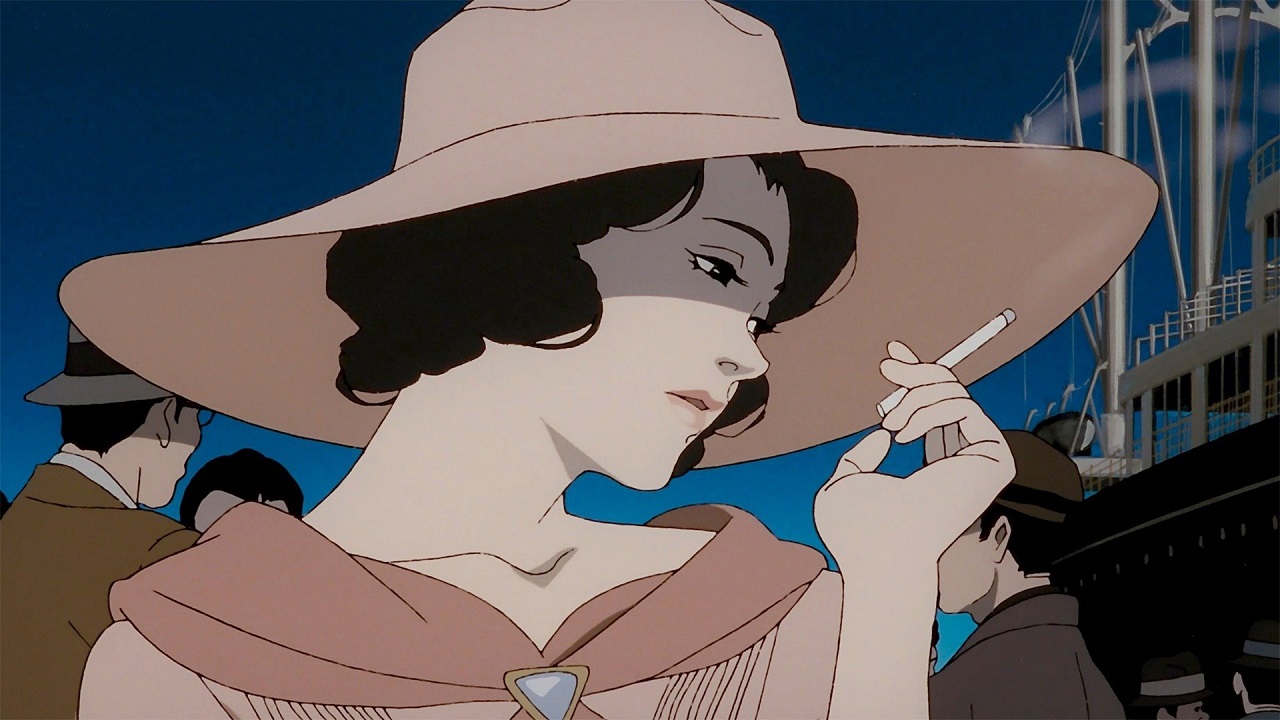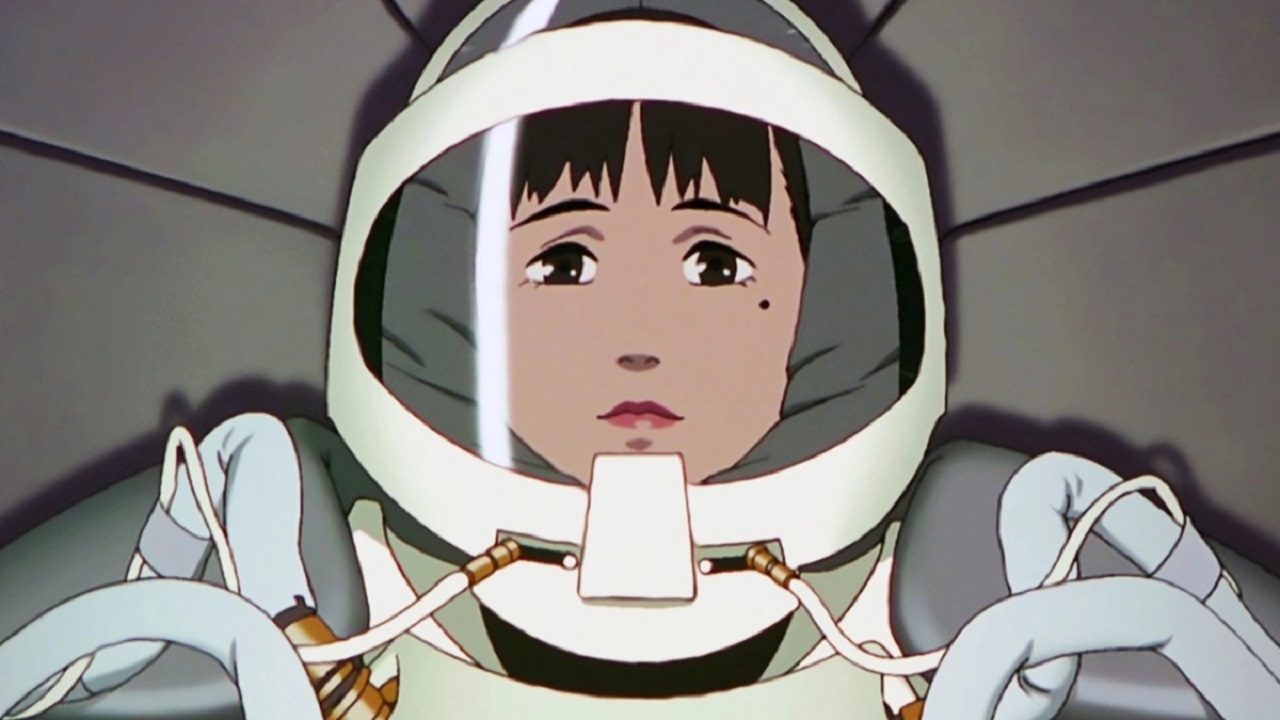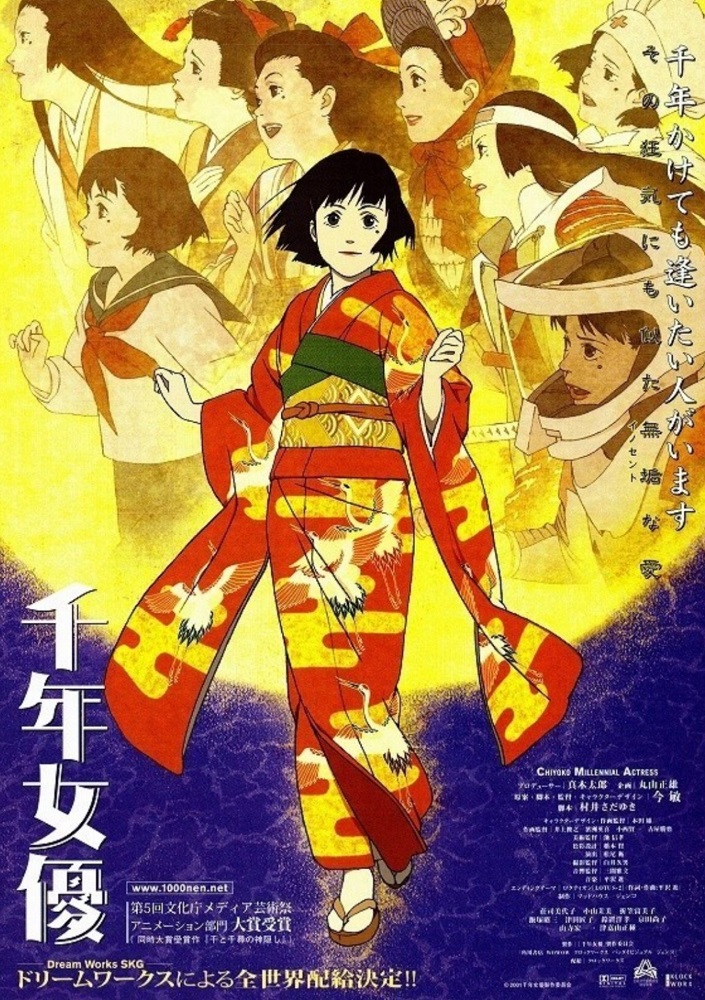(Sennen Joyou)
Crew
Director/Story – Satoshi Kon, Screenplay – Satoshi Kon & Sadayuki Murai, Producer – Taro Maki, Photography – Hisao Shirai, Music – Susumu Hirasawa, Art Direction – Nobutaka Ike. Production Company – Chiyoko Committee.
Plot
As the Ginei film studio is demolished, Genya Tachibana decides to make a documentary about the studio’s most famous star Chiyoko Fujiwara. He and his cameraman Mino track down the 70 year old Chiyoko where she lives in reclusion and interview her. As Chiyoko recounts her career, Genya and Mino travel with her through the landscape of the films that she appeared in where her life plays out. Chiyoko is obsessed with a mystery artist she met and fell in love with after he left her with a key on the set of a film. Throughout Chiyoko’s life, the mystery man, whose face she has only briefly glimpsed, continues to turn up.
In 2001, director Satoshi Kon is one of the new rising stars of Japanese anime. Kon first appeared writing the scripts for Katsuhiro Otomo films like World Apartment Horror (1991) and Memories (1995). Otomo mentored Kon’s first film – the anime psycho-thriller Perfect Blue (1997), which enjoyed considerable acclaim worldwide. Millennium Actress was Satoshi Kon’s second film and he subsequently went on to make the oddball comedy Tokyo Godfathers (2003) and the sf film Paprika (2006), before his premature death in 2010 of cancer at the age of 46.
Satoshi Kon’s films are often beautiful in terms of animation – there are some lovely shots in Millennium Actress where the heroine blurs into still photos and backgrounds. Kon’s films also markedly veer away from the typical preoccupations of anime – mass destruction, cyberpunk, demonic combat etc. Both Perfect Blue and Millennium Actress are psychological stories (as well as portraits of women celebrities) that verge on the fantastique but are primarily rooted in the mundane. On the minus side, Kon’s weakness is his plots – Perfect Blue‘s failing was a story that dissolved into a spaghetti dinner of confusing and incoherent strands.
Millennium Actress starts out as a biopic of a fictional Japanese actress. Satoshi Kon seems to have borrowed the narrative device from Waterland (1992), which had Jeremy Irons’ schoolteacher taking a classroom of kids physically back with him into his past as he narrated the story of his youth. Here Kon has used a similar device in having a documentary director and cameraman accompany the actress through her past as she tells the story of her life. However, this soon goes beyond being a mere narrative device and Kon then has the cameraman and director be able to affect actress’s past, including rescuing her upon several occasions, while the director even turn up as different characters in the various periods. Things get even stranger when Kon has the actress’s lifestory represented by the films she appears in – or at least has her past blur into various eras of Japanese filmic history.


One gets the impression that Satoshi Kon’s original idea had been to create a film that paid homage to various periods of Japanese filmic history – we go from the samurai films of Akira Kuroswa, through wartime political propaganda and geisha melodramas, even the Godzilla and Japanese science-fiction films of the 1960s. What is puzzling is when Kon has the idea of blurring these fictional scenarios into the heroine’s life. Thus we have her rivalry with fellow actress Eiko, her marriage and in particular her obsession with the mystery artist who keeps reappearing being woven into the films that she is supposedly appearing in. It is rather fascinating but also baffling. You feel like you are in the midst of a quasi-Waterland biopic that blurs into something akin to The Truman Show (1998) where the character’s life appears to being frequently staged as a film.
Like Perfect Blue, Kon throws in a twist about the two-thirds point that reveals some of the mysterious things happening to be the result of contrived machinations. In both cases, these twists are surprises but also baffling ones. I did like the ending that Millennium Actress went out on with the heroine disappearing into the stars in a rocketship, pursuing the mythic figure of the artist, something that comes to represent a unending hunt for an idealised image in memory whose actuality lies beyond this horizon.
While Millennium Actress has a number of voices that have sung its praises, I found Satoshi Kon’s failure to clearly let us into the story and his constant blurring between pseudo-documentary, narrative affectation and meta-fiction to be so random as to leave us with no idea of what is going on much of the time.


